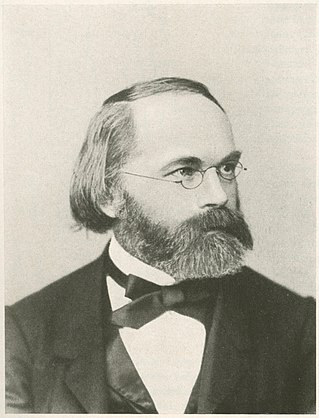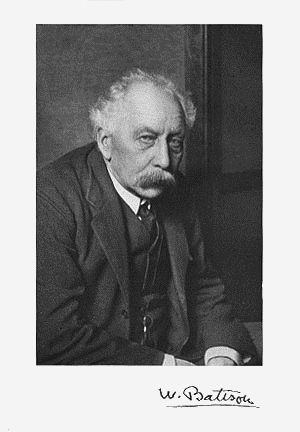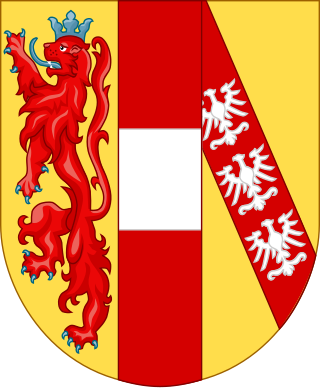Related Research Articles

Christian Andreas Doppler was an Austrian mathematician and physicist. He formulated the principle – now known as the Doppler effect – that the observed frequency of a wave depends on the relative speed of the source and the observer.

Gregor Johann MendelOSA was a German-Czech biologist, meteorologist, mathematician, Augustinian friar and abbot of St. Thomas' Abbey in Brno (Brünn), Margraviate of Moravia. Mendel was born in a German-speaking family in the Silesian part of the Austrian Empire and gained posthumous recognition as the founder of the modern science of genetics. Though farmers had known for millennia that crossbreeding of animals and plants could favor certain desirable traits, Mendel's pea plant experiments conducted between 1856 and 1863 established many of the rules of heredity, now referred to as the laws of Mendelian inheritance.

Mendelian inheritance is a type of biological inheritance following the principles originally proposed by Gregor Mendel in 1865 and 1866, re-discovered in 1900 by Hugo de Vries and Carl Correns, and later popularized by William Bateson. These principles were initially controversial. When Mendel's theories were integrated with the Boveri–Sutton chromosome theory of inheritance by Thomas Hunt Morgan in 1915, they became the core of classical genetics. Ronald Fisher combined these ideas with the theory of natural selection in his 1930 book The Genetical Theory of Natural Selection, putting evolution onto a mathematical footing and forming the basis for population genetics within the modern evolutionary synthesis.

The 1860s was a decade of the Gregorian calendar that began on January 1, 1860, and ended on December 31, 1869.

Carl Wilhelm von Nägeli was a Swiss botanist. He studied cell division and pollination but became known as the man who discouraged Gregor Mendel from further work on genetics. He rejected natural selection as a mechanism of evolution, favouring orthogenesis driven by a supposed "inner perfecting principle".

William Bateson was an English biologist who was the first person to use the term genetics to describe the study of heredity, and the chief populariser of the ideas of Gregor Mendel following their rediscovery in 1900 by Hugo de Vries and Carl Correns. His 1894 book Materials for the Study of Variation was one of the earliest formulations of the new approach to genetics.

Hugo Marie de Vries was a Dutch botanist and one of the first geneticists. He is known chiefly for suggesting the concept of genes, rediscovering the laws of heredity in the 1890s while apparently unaware of Gregor Mendel's work, for introducing the term "mutation", and for developing a mutation theory of evolution.

Erich Tschermak, Edler von Seysenegg was an Austrian agronomist who developed several new disease-resistant crops, including wheat-rye and oat hybrids. He was a son of the Moravia-born mineralogist Gustav Tschermak von Seysenegg. His maternal grandfather was the botanist, Eduard Fenzl, who taught Gregor Mendel botany during his student days in Vienna.

Reginald Crundall Punnett FRS was a British geneticist who co-founded, with William Bateson, the Journal of Genetics in 1910. Punnett is probably best remembered today as the creator of the Punnett square, a tool still used by biologists to predict the probability of possible genotypes of offspring. His Mendelism (1905) is sometimes said to have been the first textbook on genetics; it was probably the first popular science book to introduce genetics to the public.

The Catholic Church holds no official position on the theory of creation or evolution, leaving the specifics of either theistic evolution or literal creationism to the individual within certain parameters established by the Church. According to the Catechism of the Catholic Church, any believer may accept either literal or special creation within the period of an actual six-day, twenty-four-hour period, or they may accept the belief that the earth evolved over time under the guidance of God. Catholicism holds that God initiated and continued the process of his creation, that Adam and Eve were real people, and that all humans, whether specially created or evolved, have and have always had specially created souls for each individual.

The history of agricultural science is a sub-field of the history of agriculture which looks at the scientific advancement of techniques and understanding of agriculture. Early study of organic production in botanical gardens was continued in with agricultural experiment stations in several countries.

The history of genetics dates from the classical era with contributions by Pythagoras, Hippocrates, Aristotle, Epicurus, and others. Modern genetics began with the work of the Augustinian friar Gregor Johann Mendel. His work on pea plants, published in 1866, provided the initial evidence that, on its rediscovery in 1900, helped to establish the theory of Mendelian inheritance.

Friedrich Anton Maria Hubertus Bonifacius Graf von Ledebur-Wicheln was an Austrian actor who was known for Moby Dick (1956), Alexander the Great (1955) and Slaughterhouse-Five (1972).
Wilhelm Friedrich Benedikt Hofmeister was a German biologist and botanist. He "stands as one of the true giants in the history of biology and belongs in the same pantheon as Darwin and Mendel." Largely self-taught he was the first to study and establish alternation of generations and the details of sexual reproduction in the bryophytes.

The House of Habsburg-Lorraine originated from the marriage in 1736 of Francis III, Duke of Lorraine and Bar, and Maria Theresa of Austria, later successively Queen of Bohemia, Queen of Hungary, Queen of Croatia and Archduchess of Austria. Its members are the legitimate surviving line of both the House of Habsburg and the House of Lorraine and inherit their patrimonial possessions and vocation to the Empire from their female line of the House of Habsburg and from the male line of the House of Lorraine.
Ida Friederike Görres was a Catholic writer. From the Coudenhove-Kalergi family, she was the daughter, one of seven children, of Count Heinrich von Coudenhove-Kalergi and his Japanese wife Mitsuko Aoyama.

The relationship between science and the Catholic Church is a widely debated subject. Historically, the Catholic Church has been a patron of sciences. It has been prolific in the foundation and funding of schools, universities, and hospitals, and many clergy have been active in the sciences. Some historians of science such as Pierre Duhem credit medieval Catholic mathematicians and philosophers such as John Buridan, Nicole Oresme, and Roger Bacon as the founders of modern science. Duhem found "the mechanics and physics, of which modern times are justifiably proud, to proceed by an uninterrupted series of scarcely perceptible improvements from doctrines professed in the heart of the medieval schools." Historian John Heilbron says that “The Roman Catholic Church gave more financial and social support to the study of astronomy for over six centuries, from the recovery of ancient learning during the late Middle Ages into the Enlightenment, than any other, and probably all, other Institutions.” The conflict thesis and other critiques emphasize the historical or contemporary conflict between the Catholic Church and science, citing, in particular, the trial of Galileo as evidence. For its part, the Catholic Church teaches that science and the Christian faith are complementary, as can be seen from the Catechism of the Catholic Church which states in regards to faith and science:
Though faith is above reason, there can never be any real discrepancy between faith and reason. Since the same God who reveals mysteries and infuses faith has bestowed the light of reason on the human mind, God cannot deny himself, nor can truth ever contradict truth. ... Consequently, methodical research in all branches of knowledge, provided it is carried out in a truly scientific manner and does not override moral laws, can never conflict with the faith, because the things of the world and the things of faith derive from the same God. The humble and persevering investigator of the secrets of nature is being led, as it were, by the hand of God despite himself, for it is God, the conserver of all things, who made them what they are.
Classical genetics is the branch of genetics based solely on visible results of reproductive acts. It is the oldest discipline in the field of genetics, going back to the experiments on Mendelian inheritance by Gregor Mendel who made it possible to identify the basic mechanisms of heredity. Subsequently, these mechanisms have been studied and explained at the molecular level.
References
- ↑ "The Gardener of God". condor-pictures.com.
- ↑ "MENDEL/ Un film sul "padre" della genetica, quando scienza e fede spiegano la realtà". IlSussidiario.net. December 16, 2009.
- ↑ "Priest-Father of Genetics Subject of Film". December 4, 2009.
- ↑ "The Gardener of God - Ignatius Night at the Movies". www.ignatius.com.